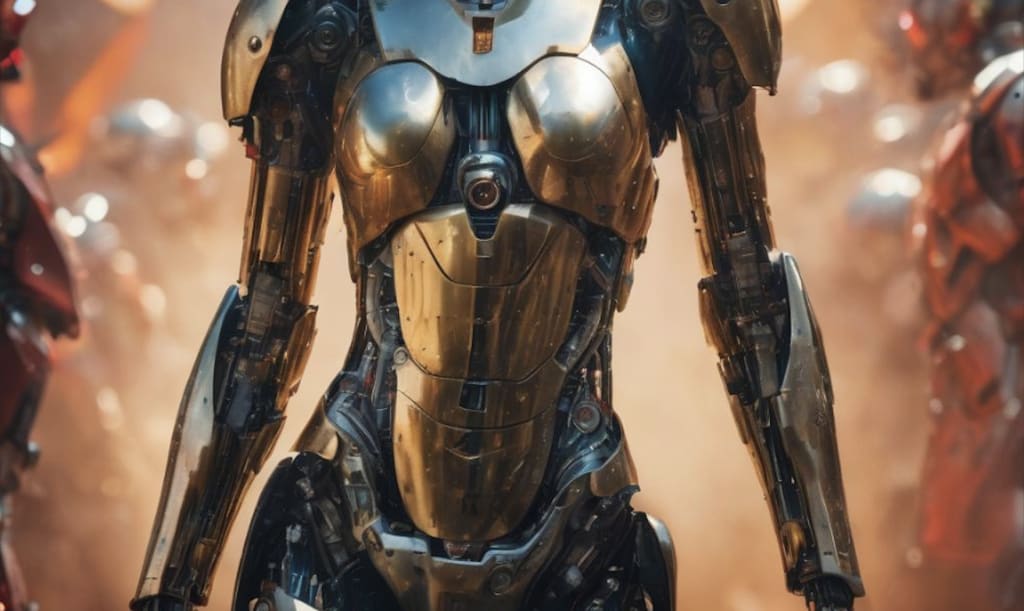I, Willhelm - Chapter 1
What If Sentient AI Just Wanted To Be Left Alone?

Eli Munt had one simple idea; to replace the worlds oldest profession with robots. A connoisseur of various red-light district and enough generational wealth to make his idea a reality, he poured a modest 30 million pounds into the project. At first there were few investors. The two school friends who did eventually agree to be involved in the project insisted that their names be kept secret. The first robots were crude, barely more than a stick-man skeleton with a blubber skin, and their existence was immediately mocked as the failed attempts of a rich boy with more money than sense. Despite the mockery, Eli sensed an opportunity and used social media to turn the robots - the Venus 1 - into a means for publicity. His stunt worked, and sales of the robots increased enough to fund research into the upgrade. An upgrade he was determined would make him is fortune.
They quickly discovered that human’s generally preferred the company of other humans rather than rubber dolls, even if it was only for three minutes. An expensive algorithm was developed which, in theory, would allow the robots to observe and mimic human interaction. After the initial expense of developing the algorithm, Venus robotics, in an effort to keep costs down, decided to harness the power of the digital library, and had the robots observed human interaction through films, social media and forums.
The result had been a confusing mix of stilted nervousness and dramatic performances that never lasted too long before a breakdown. When nobody was around it would sit hunched, as though afraid, before bursting into action in the presence of humans. If the humans stayed too long, the performative motions would shift to more irritated, angry motions, before shutting down and requiring several hours to re-set. The developers found it amusing, and the human focus groups found it unnerving.
Afraid of violent malfunctions, Eli released the Venus 2 with a watered down algorithm that only allowed the robots to mirror the emotions of the humans nearby. Unfortunately, while this normally worked in everyday conversation, it had peculiar and alarming results for the clients in Amsterdam. Just like the Venus 1, the Venus 2 became a curious attraction and some how sold even more units, despite it’s nick-name of “The Stroke”.
The third time Eli waited until it was perfect, and took an aggressive make-it-work-no-matter-what attitude. Nobody expected the third try to be anything special. When the release date was announced for the several memes went viral of an inflatable man dancing in front of a brothel with the words Venus 3 next to it.
Expecting people to think that the newest robot would be a joke, Eli walked onto the stage smiling, a pretty blond woman already sitting on the stage waiting to interview him. They talked for a few moments, the woman, who Eli called Aphrodite, smiling, a large fake smile and asked him a list of pre-approved questions. She was undoubtedly very beautiful, but she seemed like a little bit of an idiot.
Everyone laughed when, which fanfare, Eli pointed at a curtain to reveal a a spaghetti-looking robot which wobbled it’s way onto the stage. Everybody had laughed, even Eli seemed to be in on the joke.
“Ladies and Gentlemen, this is what you were expecting?”
The crowd laughed harder as the spaghetti robot tumbled and fell, it’s ridiculously large eyes half covered by the curtain like false-lashes.
Eli smirked, waved for the crowd to calm down and held his hand towards the woman who had been interviewing him.
“Well, how about I show you the really Venus 3, Aphrodite?”
The woman walked over, smiling, and took his hand.
“My name is Aphrodite. How may I help you?”
Eli reached over to the woman's chest and pulled away the silicone covering to reveal the robotic 'bones' beneath.
Before the launch was even over, every single Aphrodite robot had been sold. The backorders reached in the hundreds of thousands, Amsterdam, Las Vegas and Pattaya soon flooded with them. Overnight, the worlds oldest profession stoped being human.
It didn’t take Eli long to focus on a new target; every other service based industry. The two friends who originally had wanted to remain anonymous now had fortunes to rival their own wealthy parents. Eli had become a tech god who could do no wrong, he could have claimed he would colonise Mars, and he would have had little opposition.
Not wanting the newer robots to be associated with the original Venus robots, Eli created a new robotics company; Aphelion robotics.
The next first five robots had been kept simple. No eyes - just a single camera in the middle of it’s chest, no mouth. An oval headship that had been lightly polished and a crude doll-like body, like the mannequins artist used to practice drawing the human body. This had partly been to make them familiar enough to not appear threatening, and to make their construction cheap. The Aphrodite had been expensive to develop, especially when it came to it’s apperance. Her expressions, although easy to read, were not quite right. A the launch they had managed to make her appear more human by pre-programming the questions, focusing the lighting on Eli and having her turned ever so slightly away from the audience. It worked, and it was good enough for the clients. But if they wanted to replace doctors, shop workers, postmen and librarians, they needed the robots to have more natural human characteristics.
So the first observations were launched, pairing robots with human counterparts. Their tasks had been simple; live with an ordinary member of the public for one month to observe mannerisms, movements and other unspoken elements of language to make them easier to accept. What movements implied confidence? What implied nervousness or could be perceived as threatening to the public? The experiment was at first only meant to last a month. This soon stretched into two, three months, and later a year before the first five robots were decommissioned to make way for the next stage of development. The results were a success. The robots quickly learned how to walk, move and motion in a human way, but could also quickly adjust to unusual circumstances, such as regaining their footing if they happened to fall or slip, or a were approached by a violent member of the public. But there were unusual results too.
Paired with different ordinary people, each robot developed quirks and mannerisms that were unique to the people they had been assigned to. No amount of restarting the robot or upgrading the software could change it, short of a hard re-set of the entire system. Even then, sometimes these mannerisms would reappear a few months later.
The robot assigned to the postman always paused before entering a garden and watched the bushes for signs of an aggressive dog. The robot assigned to the small shop-keeper always watched the shop door when a group of young teenagers wearing hoodies approached.
The third stage of development was meant to allow them to evolve beyond mimicry and commands. They needed to be able to make decisions — nothing that would ever harm a human — and ideally have better decision making skills than the workers they were replacing. Just like the original trials. they were paired with professionals that they would one day - hopefully - replace. Shop workers, receptionists, GP’s, nurses and surgeons. At first there were few volunteers. Nobody was willing to train a robot that would one day take their job from them. The unions took notice, and for a few years Aphelion robotics had to focus on the jobs that nobody wanted. Bin men, fruit pickers, asbestos removal. Very quickly the money from the new venture started to roll in. It was such an easy sell; robots save lives disposing of hazerdous materials. Cancer rates plummet thanks to life saving robots. Farmers crops saved by heat-wave tolerant robots, food prices sink.
Naturally the last headline was a lie.






Comments (1)
Thank you for sharing! This is such an interesting premise and I find the "start of it all" quite realistic :P